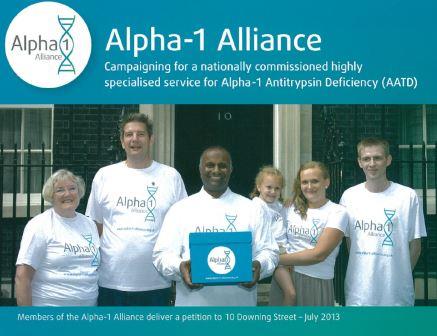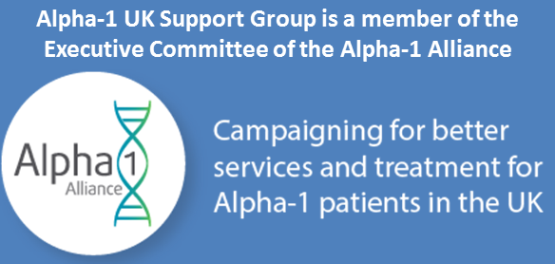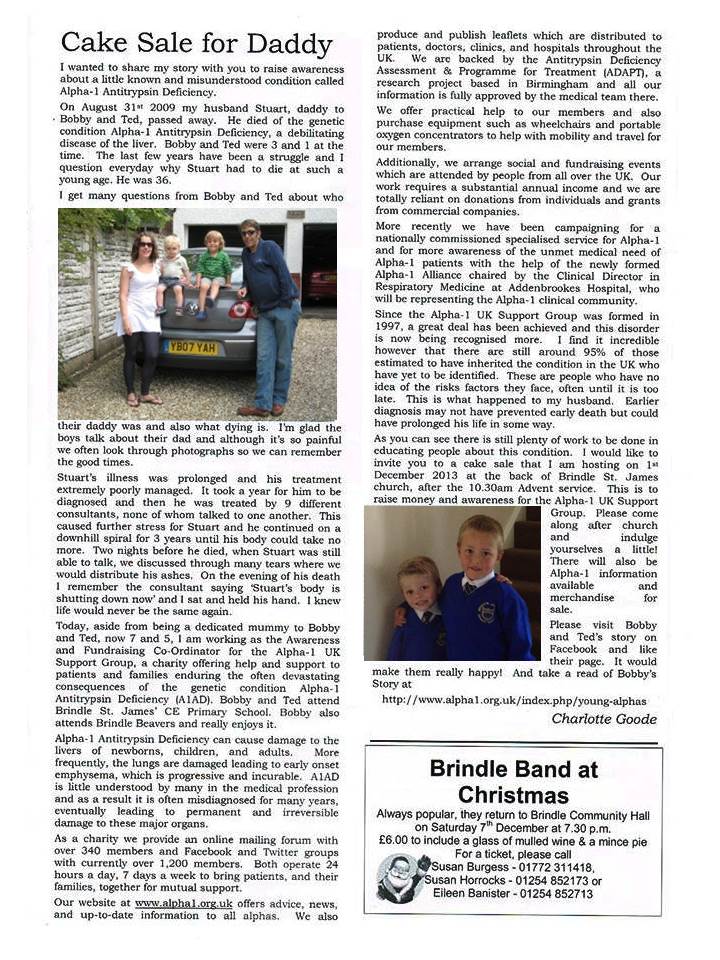Kamada Announces Completion of Pivotal Phase II/III Clinical Trial in Europe and Canada of Inhaled AAT to Treat Alpha-1 Antitrypsin Deficiency
NESS ZIONA, Israel (December 11, 2013) – Kamada Ltd. (Nasdaq and TASE: KMDA), a plasma-derived protein therapeutics company focused on orphan indications, announces completion of the pivotal Phase II/III clinical trial in Europe and Canada of the Company’s proprietary inhaled Alpha-1 Antitrypsin (AAT) therapy for the treatment of Alpha-1 Antitrypsin Deficiency (AATD or Inherited Emphysema). Kamada expects to report top-line results from this study in the first quarter of 2014.
The multicenter randomized, double-blind, placebo-controlled study is evaluating the safety and efficacy of Kamada’s inhaled formulation of human AAT to treat AATD in >160 patients. The study involved the inhalation of 160 mg of human AAT or placebo twice daily via the eFlow® device for 50 weeks, and eligible patients were given the option to participate in a 50-week open-label extension study. The primary endpoint of the study is the difference in exacerbation events between the two groups at one year and is 80% powered to demonstrate a 20% difference. Power is based on the number of events collected during the study. Secondary endpoints include additional parameters of exacerbation events, pulmonary function tests and safety. Additional exploratory endpoints include CT densitometry in subset of subjects, Quality of Life measurements and more.
In September 2013 the Company issued a fifth interim safety report based on data of all patients in the trial as of that date, which was supportive and consistent with previous reports and demonstrated a high safety and tolerability profile. At that time, observed adverse events were related to the expected known symptoms of Inherited Emphysema. No allergic reactions or signs of any risk related to the use of the inhalation device were observed.
“We are proud to have completed this pivotal study as planned and look forward to realizing the potential of our breakthrough inhaled AAT product. The controlled portion of this pivotal study is complete, with patients still being treated in an open-label extension study, for which enrollment rates are very high. We believe these high enrollment rates, as well as the additional treatment time on the drug, especially for patients who were on placebo, further support patient and physician preference for an inhaled treatment for AATD,” noted David Tsur, Chief Executive Officer of Kamada.
“In conjunction with pre-launch marketing activities performed by Chiesi, our European marketing partner, we are in the process of preparing a marketing authorization application (MAA) for the European Medicines Authority (EMA), which we expect to submit in the second half of 2014. We look forward to advancing our innovative and potentially more efficacious treatment for patients suffering with this chronic, life-threatening, inherited lung disease,” added Mr. Tsur.
“The opportunity to build a sizeable market is strong, as patients suffering from AATD remain under-identified and under-treated with less than 5% of cases treated in the U.S. and approximately 2% in Europe. The availability of a simple blood test for the diagnosis of AATD is expected to further increase awareness and favorably impact demand. We expect that greater AAT use in Europe and other geographies could also accelerate market growth. Moreover, we believe this non-invasive, user-friendly potential alternative to intravenous AAT is highly attractive as a chronic therapy that represents a compelling commercial opportunity,” concluded Mr. Tsur.
In August 2012 Kamada signed an exclusive agreement for the distribution of its inhaled AAT for the treatment of AATD in Europe and with Chiesi Farmaceutici S.p.A, a fully integrated European pharmaceutical company focused on respiratory disease and special care products. Under the agreement Kamada is eligible to receive milestone payments of up to $60 million, subject to achievement of certain regulatory and sales targets. The agreement is for 12 years and Kamada estimates that the sales potential from the agreement, provided its inhaled AAT product is approved for this indication, may reach hundreds of millions of dollars in the coming years.
Kamada received approval of its Investigational New Drug application from the U.S. Food and Drug Administration (FDA) for a Phase II clinical trial with inhaled AAT for AATD, and expects to initiate that trial in the coming months.
The Company’s flagship product is Glassia®, the first and only liquid, ready-to-use, intravenous plasma-derived AAT product approved by the FDA. Glassia is marketed in the U.S. through a strategic partnership with Baxter International.
About Alpha-1 Antitrypsin Deficiency
Alpha-1 antitrypsin, also called AAT, is a protein made in the liver. Normally the protein travels through the bloodstream and helps protect the body’s organs from the harmful effects of other proteins. The lungs are one of the main organs that the AAT protein protects. AAT deficiency (AATD) occurs if the AAT proteins made in the liver are not the right shape, and they get stuck inside liver cells and cannot get into the bloodstream. As a result, not enough AAT proteins travel to the lungs to protect them, which increases the risk of lung disease. Also, liver disease can develop because too many AAT proteins are stuck in the liver. Severe AATD occurs when blood levels of the AAT protein fall below the lowest amount needed to protect the lungs.
AATD is an inherited condition that occurs in all ethnic groups, yet most often in Caucasians of European descent. It is not known how many people have AAT deficiency and many people who have the condition may not know they have it. According to the National Institutes of Health, estimates of disease incidence range from about 1 in every 1,600 people to about 1 in every 5,000 people.
About Kamada
Kamada Ltd. is focused on plasma-derived protein therapeutics for orphan indications, and has a commercial product portfolio and a robust late-stage product pipeline. The Company uses its proprietary platform technology and know-how for the extraction and purification of proteins from human plasma to produce Alpha-1 Antitrypsin (AAT) in a highly-purified, liquid form, as well as other plasma-derived proteins. AAT is a protein derived from human plasma with known and newly-discovered therapeutic roles given its immunomodulatory, anti-inflammatory, tissu
e-protective and antimicrobial properties. The Company’s flagship product is Glassia®, the first and only liquid, ready-to-use, intravenous plasma-derived AAT product approved by the U.S. Food and Drug Administration. Kamada markets Glassia in the U.S. through a strategic partnership with Baxter International. In addition to Glassia, Kamada has a product line of nine other pharmaceutical products that are marketed through distributors in more than 15 countries, including Israel, Russia, Brazil, India and other countries in Latin America, Eastern Europe and Asia. Kamada has five late-stage plasma-derived protein products in development, including an inhaled formulation of AAT for the treatment of AAT deficiency that completed a pivotal Phase II/III clinical trials in Europe and will be entering Phase II clinical trials in the U.S. Kamada also leverages its expertise and presence in the plasma-derived protein therapeutics market by distributing 10 complementary products in Israel that are manufactured by third parties.
Cautionary Note Regarding Forward-Looking Statements
This release includes forward-looking statements within the meaning of Section 27A of the U.S. Securities Act of 1933, as amended, Section 21E of the US Securities Exchange Act of 1934, as amended, and the safe harbor provisions of the U.S. Private Securities Litigation Reform Act of 1995. Forward-looking statements are statements that are not historical facts, such as statements regarding assumptions and results related to financial results forecast, commercial results, clinical trials, the EMA and U.S. FDA authorizations and timing of clinical trials. Forward-looking statements are based on Kamada’s current knowledge and its present beliefs and expectations regarding possible future events and are subject to risks, uncertainties and assumptions. Actual results and the timing of events could differ materially from those anticipated in these forward-looking statements as a result of several factors including, but not limited to, unexpected results of clinical trials, delays or denial in the U.S. FDA or the EMA approval process, additional competition in the AATD market or further regulatory delays. The forward-looking statements made herein speak only as of the date of this announcement and Kamada undertakes no obligation to update publicly such forward-looking statements to reflect subsequent events or circumstances, except as otherwise required by law.
Source: http://www.kamada.com/press_item.php?ID=76

 The Alpha-1 UK Support Group will be holding their 1st Scottish Social Gathering and Information Day on Saturday 29th March at the Discovery Point Dundee.
The Alpha-1 UK Support Group will be holding their 1st Scottish Social Gathering and Information Day on Saturday 29th March at the Discovery Point Dundee.  The Alpha-1 Alliance submitted a flyer to the Winter Conference of the British Thoracic Society (BTS), which took place from 4th – 6thDecember in London. The BTS conference brings together the clinical community in respiratory medicine.
The Alpha-1 Alliance submitted a flyer to the Winter Conference of the British Thoracic Society (BTS), which took place from 4th – 6thDecember in London. The BTS conference brings together the clinical community in respiratory medicine. Charlotte Goode’s husband, Stuart, 36, died in August 2009 from an inherited condition which caused liver and lung disease. He left two young sons.
Charlotte Goode’s husband, Stuart, 36, died in August 2009 from an inherited condition which caused liver and lung disease. He left two young sons.



